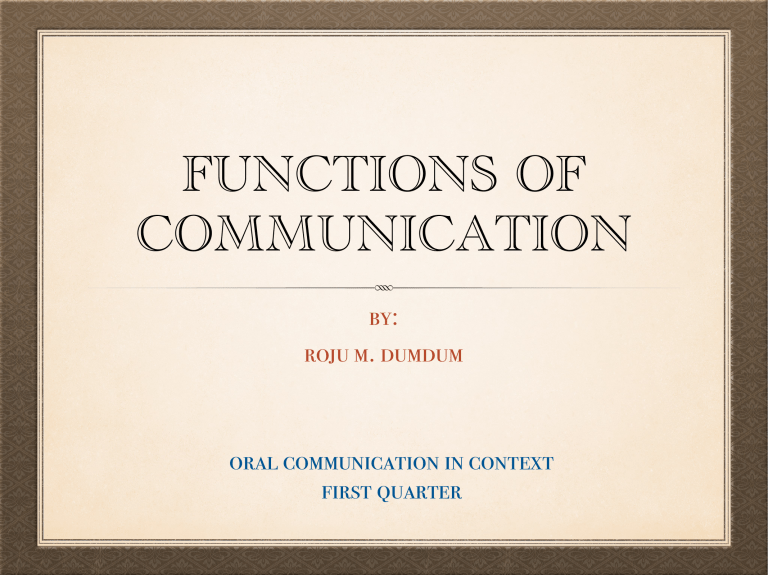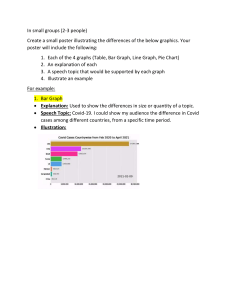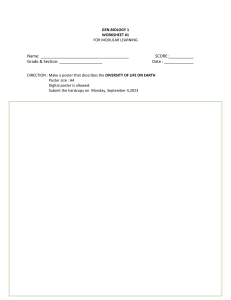Uploaded by
RABABETH ESTRADA
Functions of Communication: Teaching Guide for High School
advertisement

FUNCTIONS OF COMMUNICATION by: roju m. dumdum oral communication in context first quarter Republic of the Philippines Department of Education Region VI - Western Visayas DIVISION OF ESCALANTE CITY Escalante City, Negros Occidental, Philippines Tel. No. +63-34-724-8192 Telefax No.:+63-34-454-0746Email: escalante.city@deped.gov.ph Author Roju M. Dumdum Copyright 2019 Section 9 of Presidential Decree No. 49 provides: Cataloguer Ethel S. Gali Project Development Officer Clint S. Cinco Division Quality Assurance Joan A. Mondin Norlene N. Alsado Ma. Suzette L. Abello Rebecca T. Amene Ma. Theresa L. Tabotabo, PhD Project Manager Jason R. Alpay Executive Managers “No copyright shall subsist in any work of the Government of the Republic of the Philippines. However, prior approval of the government agency of office wherein the work is created shall be necessary for exploitation of such work profit.” This material has been developed within the Project in English implemented by Curriculum and Learning Management Division (CLMD) of the Department of Education Region VI-Western Visayas. It can be reproduced for educational purposes and the source must be clearly acknowledged. The material may be modified and the derivatives of the work including creating an edited version, an enhancement or a supplementary work are permitted provided all original work is acknowledged and the copyright is attributed. No work may be derived from this material for commercial purposes and profit. Ivy Joy A. Torres Chief, CID Ermi V. Miranda, PhD OIC, Schools Assistant Division Superintendent Clarissa G. Zamora, CESO VI OIC, Schools Division Superintendent Grade 11 Grade Level English Language Preface The Senior High School (SHS) pedagogy takes a different light as opposed to the lower grade levels. The teaching strategies and approaches lie in the threshold of higher education instruction. As such, the Teaching Guide (TG) in Oral Communication in Context is developed to respond to such consideration. The teaching guide regards lessons as one big concept rather than as a fragmented idea, whereby a learning competency is taught separately. The teaching guide rigorously follows the learning competencies to ensure the attainment of the curriculum standards. It, however, contains lessons for the first quarter, particularly Functions of Communication. This material is also made to prepare SHS students for whichever exit points they plan on pursuing after high school — college, business, or employment. Keynote presentations complete with exercises and enrichment activities are included in this material. Teachers, therefore, are encouraged to modify or improve the material to suit to the learners’ needs and capacity. While utilizing this resource package, it is hoped that teachers and students alike would experience a good measure of fun and delight. R. M. Dumdum Teaching Guide in Oral Communication in Context Functions of Communication Topic Functions of Communication (OC11.2) Content Standard The learner values the functions/purposes of oral communication. (Slide #2) Performance Standard The learner writes a 250-word essay of his/her objective evaluation of the various speakers watched and listened to. (Slide #3) Learning Competencies The learner (Slide #4) a. discusses the functions of communication. (EN11/12OC-Ibe-8) b. identifies the speaker’s purpose(s). (EN11/12OC-Ibe-9) c. evaluates the effectiveness of oral communication activity (EN11/12OC-Ibe-14) Time Allotment 8 hours Lesson Outline Activity (60 minutes) (Slide #5-8) The learner will perform the following activity. Throwback Movies: ACTually Directions: Deliver the following lines from the popular Filipino movies. Tell whether the following lines aims to control someone, develop intimacy, express desires, inform, or express strong emotions. 1. “You’re nothing but a second-rate, trying hard copycat!” - Cherie Gil, Bituing Walang Ningning (1985) - express strong emotions Introduction/ Motivation 2. “Ayoko ng tinatapakan ako, ayoko ng masikip, ayoko ng mabaho, ayoko ng walang tubig, ayoko ng walang pagkaian, ayoko ng putik!” - Maricel Soriano, Kaya Kong Abutin ang Langit, (1984) – express desires 3. “I was never your partner, I’m just your wife…” - Sharon Cuneta, Madrasta (1996) – inform 4. “Mahal mo ba ako dahil kailangan mo ako, o kailangan mo ako kaya mahal mo ako?” - Claudine Barretto, Milan (2004) – develop intimacy 5. “Ding, ang bato!” – Vilma Santos, Lipad, Darna, Lipad (1973) – control Functions of Communication 1 6. “My brother is not a pig! Ang kapatid ko ay tao, hindi baboy damo!” – Nora Aunor, Minsa’s Isang Gamugamo (1976) – express strong emotions 7. Ang mga tala… mataas, mahirap maabot. Pero ipinapangako ko, Inay… bukas, luluhod ang mga tala!” - Sharon Cuneta, Bukas Luluhod Ang Mga Tala (1984) – express desires 8. “I don’t deserve to be treated like this. I care about my job sir. I care about you.” – Sharon Cuneta, Caregiver (2008) – develop intimacy 9. “Wala akong pakialam…ibalik mo sa akin si Jun-jun. Ibalik mo sa akin ang anak ko! Ibalik mo sa akin si Jun-jun. Ibalik mo ang…ahhhhhh!” – Vilma Santos, Paano Ba ang Mangarap? (1983) – control 10. The business… is very good. And the office… is very big. And the bank… is very nice.” – Eugene Domingo, Kimmy Dora: Kambal sa Kiyeme (2009) - inform Lecture-Discussion (120 minutes) The teacher will discuss the functions of communication. Definition of Functions of Communication (Slide #9) Functions of communication refer to how humans use language for different purposes. Five Functions of Communication 1. Regulation/Control (Slide #11-14) Instruction/ Delivery Uses of communication - control human behavior - regulate the nature and amount of activities humans engage in Examples: doctor’s prescriptions, parents’ instructions to their children, scolding, employers’ orders to employees, customer’s making orders, etc. Language forms for regulation/control Form of Commands (Imperatives) - Please come in. - Get a chair. - Run. Questions that influence human behavior - Why don't we go to the dining room now? Functions of Communication 2 - Do you have a pen? Can you pass the salt? Declaratives - I want to be alone. - It’s hot in here. - You need to hurry. - That’s not the right thing to do. Importance of regulation/control - Sense of control over our lives and the world around us, else, we feel powerless. - Communication as a means to regulate/control human behavior ranges from simple requests to laws governing large countries and territories. - It is a powerful function of language. 2. Social Interaction (Slide #15-17) Human beings develop and maintain bonds, intimacy, relations, and associations. Examples: pick-up lines, invitations, greetings, appreciation, encouragement, marriage proposal, game plans, etc. Example Expression - Let’s be friends. - Will you marry me? - Be my group partner. - I like you. - Hello! 3. Motivation (Slide #18-20) Motivation as a function refers to a person using language to express desires, needs, wants, likes and dislikes, inclinations, choices, and aspirations. Examples: expressing one’s ambitions, ordering in a fast food restaurant, asking for milk, making petitions, picketing, etc. Example Expressions - I need… - I want… - Give me… - I dream of… - I like… - We pray for… Functions of Communication 3 Importance of Social Interaction - One of the most basic functions of human communication. - Without motivation, humans experience powerlessness and a feeling of being trapped. - It strengthens social interactions. - It is very central to human identity. 4. Information (Slide #21-24) Communication can be used for giving and getting information. - Giving of information (statement of facts) - Getting information (asking questions) Giving information using statements - I have three brothers. - Philippine Normal University was established in 1901. Giving information using a rhetorical question - Did you know that some earphones can be used as microphones? Getting information using questions - Have you had lunch? - Did it rain last night? Getting information using imperatives - Tell me how much a can of corned beef costs. - Give me information regarding the weather. Getting information using declaratives - I don’t know where to find the city hall. - I need to understand how my bill was computed. Importance of Information - Communication as information enables human to get to know the world and process and structure what they learn about it. 5. Emotional Expression (Slide #25-26) - Emotions are a central part of who we are. Humans need to let the emotions out otherwise they harm our well-being. Emotional expression through language can come in the form of interjection and exclamation. Emotional Expressions - Yes! - Oh no! - Ouch! Functions of Communication 4 - <expletives> Really? Non-verbal - Gestures - facial expression - simple or energetic body movements Group Dynamics (60 minutes) (Slide #28-29) The learners will perform the following activities. Group 1 - Role-play as a newscaster giving the news. (Information) Group 2 - Role-play as friends hanging out. (Social Interaction) Group 3 - Role-play as a customer ordering in a fast food restaurant. (Motivation) Group 4 - Role-play as doctor giving prescriptions to patients. (Regulatory/Control) Group 5 - Sing a short portion of a song that is sad, angry or happy. (Emotional Expression) Practice Rubric for Role Play Score Description 20 The performer uses many forms and expressions effectively to fully accomplish his or her intended use or function of language. 15 The performer uses many forms and expression effectively to accomplish his or her intended use or function of language, but some forms and expressions are not evident or appropriate to the function intended. 10 The performer can use only a few forms and expressions to accomplish his or her intended use or function for language, many forms and expressions are no evident or appropriate to the function intended. 5 The performer is totally unable to use forms and expressions to accomplish his or her intended use or function of language. Functions of Communication 5 (60 minutes) (Slide #30-31) Learners will create an infographic showing the functions of communication. Directions: • Create an infographic showing the functions of communication, complete with examples. • Post your infographic in your website or in our google classroom. • Let your classmates give their comments on your infographic. Rubric for Infographic 1 point Title Enrichment No title for poster 2 points Does not have a title that lets the reader know what the poster is about. 3 points 4 points Has a title that gives a Has a clear title that reasonable idea ties into the subject of what the poster of the poster. is about. Missing most required Missing all elements needed required to make reader elements understand the needed to meaning of the make reader poster or all understand elements are the meaning there but their of the placement would poster. cause the reader confusion. Has most of the required elements needed to make the reader understand the meaning of the poster. Has all of the elements required to make reader understand the meaning of the poster. All elements are placed in a well thought out way. Does not have clear and relevant Does not graphics/pictures have any that are important graphics/pict to the meaning of ures, No the poster and its Presentation outlining, information. may and or may not lack information outlining and is in pencil. information may be difficult to understand. Has some clear and relevant graphics/pictures that are important in explaining the meaning of the poster that are mostly outlined, and the information makes sense. Has clear and relevant graphics/pictures that are outlined or colored, and are important in explaining the meaning of the poster and all information is clear and easy to read. Does not have neat lettering that is legible or bold. The graphics are not colorful or large enough to be seen. Has neat lettering that is legible or bold, and some graphics that are colorful or large enough to be seen. Has very neat lettering that is legible and bold, and graphics that are colorful and large enough to be seen. Guidelines Neatness Is missing legible lettering, pictures and other important elements. Source: https://www.rcampus.com/rubricshowc.cfm?code=JX9XXW2&sp=yes& Functions of Communication 6 (180 minutes) (Slide #32-35) The learner will do the following tasks. 1. Identify the communication function for a given segment of the video clip. A portion of what the characters are saying and the time stamp in the video Specific description of communication function (Give the specific activity related to the function, that is, what are the characters engaging in?) 1 2 3 4 5 https://www.youtube.com/watch?v=Z7DDAaywsTk https://www.youtube.com/watch?v=sCG88QHentc https://www.youtube.com/watch?v=5Ikl_1f-aYQ Evaluation 2. Write a 250-word essay of your objective evaluation of the various speakers watched and listened to. Rubric for Essay Traits Focus & Details 6 There is one clear, wellfocused topic. Main ideas are clear and are well supported by detailed and accurate information. The introduction is inviting, states the main topic, and provides an overview of the paper. Organization Information is relevant and presented in a logical order. The conclusion is strong. 4 2 1 There is one clear, wellfocused topic. Main ideas are clear but are not well supported by detailed information. There is one topic. Main ideas are somewhat clear. The topic and main ideas are not clear. The introduction states the main topic and provides an overview of the paper. A conclusion is included. The introduction states the main topic. A conclusion is included. There is no clear introduction, structure, or conclusion. Functions of Communication 7 The author’s purpose of writing is very clear, and there is strong evidence of attention to audience. The author’s extensive knowledge and/or experience with the topic is/are evident. The author’s purpose of writing is somewhat clear, and there is some evidence of attention to audience. The author’s knowledge and/or experience with the topic is/are evident. The author’s purpose of writing is somewhat clear, and there is evidence of attention to audience. The author’s knowledge and/or experience with the topic is/are limited. The author’s purpose of writing is unclear. The author uses vivid words and phrases. The choice and Word Choice placement of words seems accurate, natural, and not forced. The author uses vivid words and phrases. The choice and placement of words is inaccurate at times and/or seems overdone. The author uses words that communicate clearly, but the writing lacks variety. The writer uses a limited vocabulary. Jargon or clichés may be present and detract from the meaning. Voice Sentence Structure, Grammar, Mechanics, & Spelling All sentences are well constructed and have varied structure and length. The author makes no errors in grammar, mechanics, and/or spelling. Most sentences are well constructed and have varied structure and length. The author makes a few errors in grammar, mechanics, and/or spelling, but they do not interfere with understanding. Most sentences are well constructed, but they have a similar structure and/or length. The author makes several errors in grammar, mechanics, and/or spelling that interfere with understanding. Sentences sound awkward, are distractingly repetitive, or are difficult to understand. The author makes numerous errors in grammar, mechanics, and/or spelling that interfere with understanding. Source: http://www.readwritethink.org/files/resources/printouts/Essay%20Rubric.pdf Score 28-30 25-27 23-24 21-22 20 and below Materials References Level of Proficiency Advanced Proficient Approaching Proficiency Developing Beginning Multimedia projector, microphone, amplifier, video clip Peña, A.R., & Anudin, A. G. (2016). Oral communication. Quezon City: Vibal Group Inc. Sipacio, P. J., & Balgos, A.N. (2016). Oral communication in context for senior high school. Quezon City: C & E Publishing, Inc. Functions of Communication 8 Prepared by: ROJU M. DUMDUM Senior High School Teacher Old Poblacion National High School Functions of Communication 9


